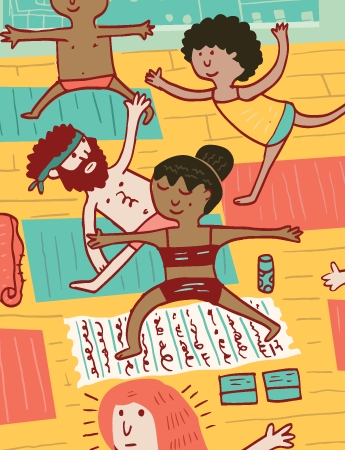It probably won’t surprise you that I like writing. I’m also a fan of yoga. Both make me feel more at ease in myself, mentally and physically. While the two practices may not seem to have much in common, they find union in a space of creativity and exploration, each manifested in a different way. Writing tends to be a head activity, and yoga one of the body, but both can be whole-body experiences with remarkable results.

‘Curiosity is the force that keeps us both writing and doing yoga.’ Illustration by Josh Quick.
Christina von Jakubowski studied the intersection of creative writing and yoga for her bachelor’s thesis, and ran workshops and surveys as part of her research. For her, it is all about ‘flow,’ as defined by Mihaly Csikszentmihalyi. Being fully present in either asana or writing is considered an optimal state where the true self might come through. Jakubowski’s workshops have shown that, when doing asana practice before writing creatively, individuals may have easier access to the right hemisphere of their brain, where creativity lives. Additionally, the value of tuning our attention can make us better writers. By paying faithful attention to the body and the world around us, we become aware of details and insights, which can enrich our writing. Individuals may even write something they don’t think they could have accessed without yoga.
Jeannine Ouellette, who set up Elephant Rock retreats to combine the loves of her life (writing, teaching, and yoga), told me in an interview, ‘People are stunned by what they produce on the retreats. You become a conduit, and the writing moves through you instead of coming from you pre-formed. As a result, you truly surprise yourself. The best writing should also be very physical, and yoga provides a way to make that more possible. It brings the writing to life, literally.’ I love to read dynamic and active writing that really lifts me up and pulls me in—yoga can be a way to bring that energy to the page.
There are some fantastic resources out there for both writing about yoga, for using yoga as a vehicle to inspire writing. As Lacey Haynes, author of Yoga & Creativity and now a motherhood expert told me, ‘The more connected you become with yourself, the more authentic the creative process becomes. It’s about becoming a more attuned and proficient writer through the lens of self-inquiry. Yoga becomes this tool for self-discovery and self-awareness, two huge parts of any creative endeavor.’
Who hasn’t felt something profound as they move into a position on a mat, or felt they have discovered a part of them, missing for so long, as they ease into a posture? I adore the phrase ‘be curious.’ These are words oft heard in the yoga studio. Curiosity is the force that keeps us both writing and doing yoga. It is an exploration of what it means to be an individual, physically, mentally and emotionally. A drive towards questioning and exploration is necessary for both practices. In this way, Jeannine teaches writing from the perspective of ‘befriending the unknown.’ ‘We have to be willing to let the story,’ she says, ‘even our own biographical story, take us where it wants to go, not just where we think it goes. There needs to be a mystery in the process, otherwise the writing is dead on the page.’
Both practices demand a certain discipline and regularity, but also freedom. Showing up to the mat or the page, and allowing the inner self to flow, is at the root of both disciplines. Many writers swear by the ‘morning pages,’ in which they write automatically from their subconscious immediately after waking. It’s a form of morning meditation. I’ve tried a regular routine for both and, while I’ve not always been able to stick at it, I’ve seen the benefits.
Yoga offers a new perspective on the body and mind, which can be just what one needs when it comes to writing. Finding a sense of playfulness, connection, and knowledge of self is ideally what writing does for us—as does yoga. Whether you keep a pencil by your yoga mat or do the downward dog when you want to write, it’s worth thinking about how a yoga practice might enhance your creativity and how movement in the body can free up your mind, resulting in words you may not have otherwise imagined.
 Francesca Baker is a writer and wonderer with a passion for creativity and connection. You can read more of her writing here and follow her on Twitter and Instagram.
Francesca Baker is a writer and wonderer with a passion for creativity and connection. You can read more of her writing here and follow her on Twitter and Instagram.
